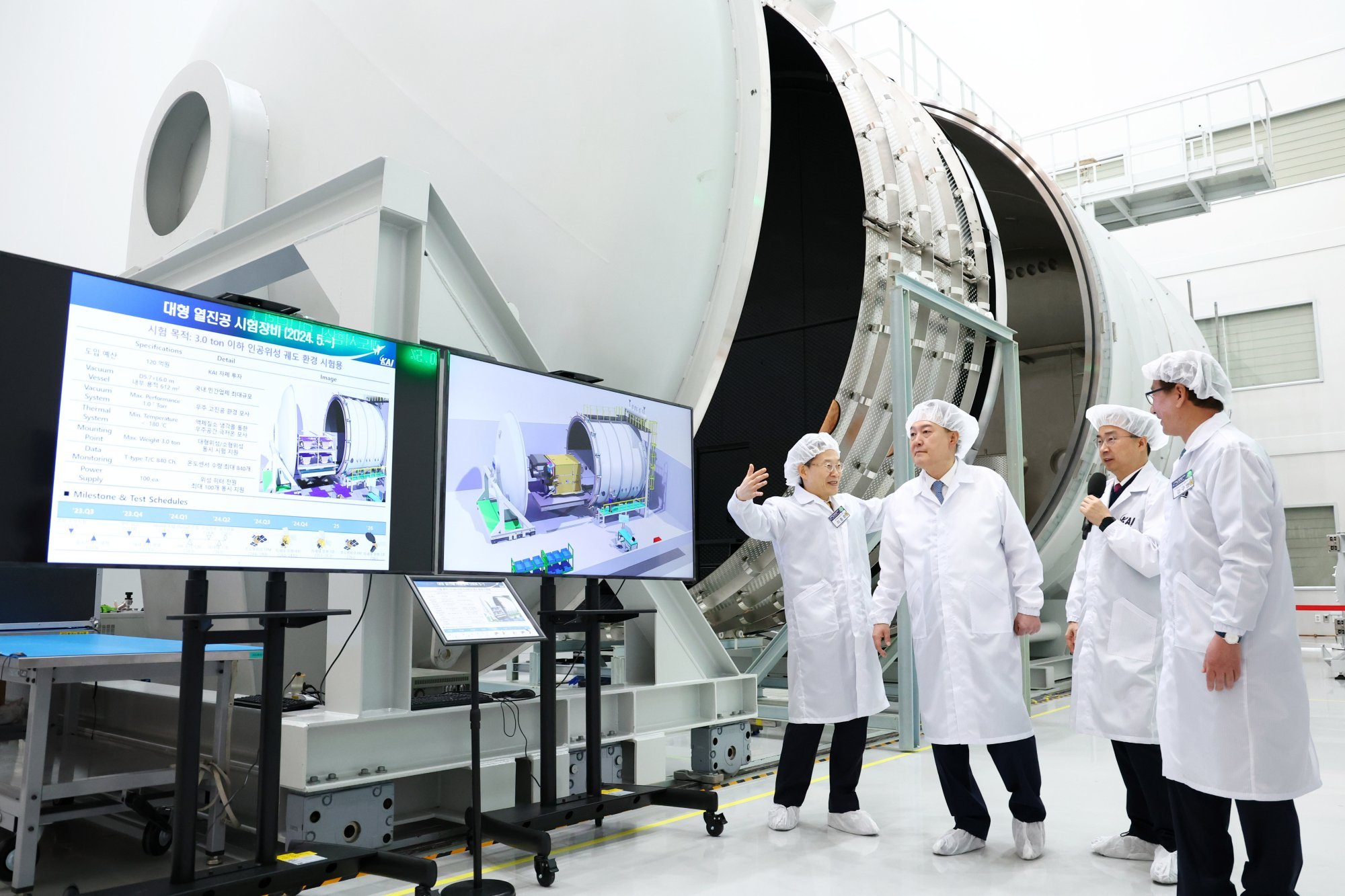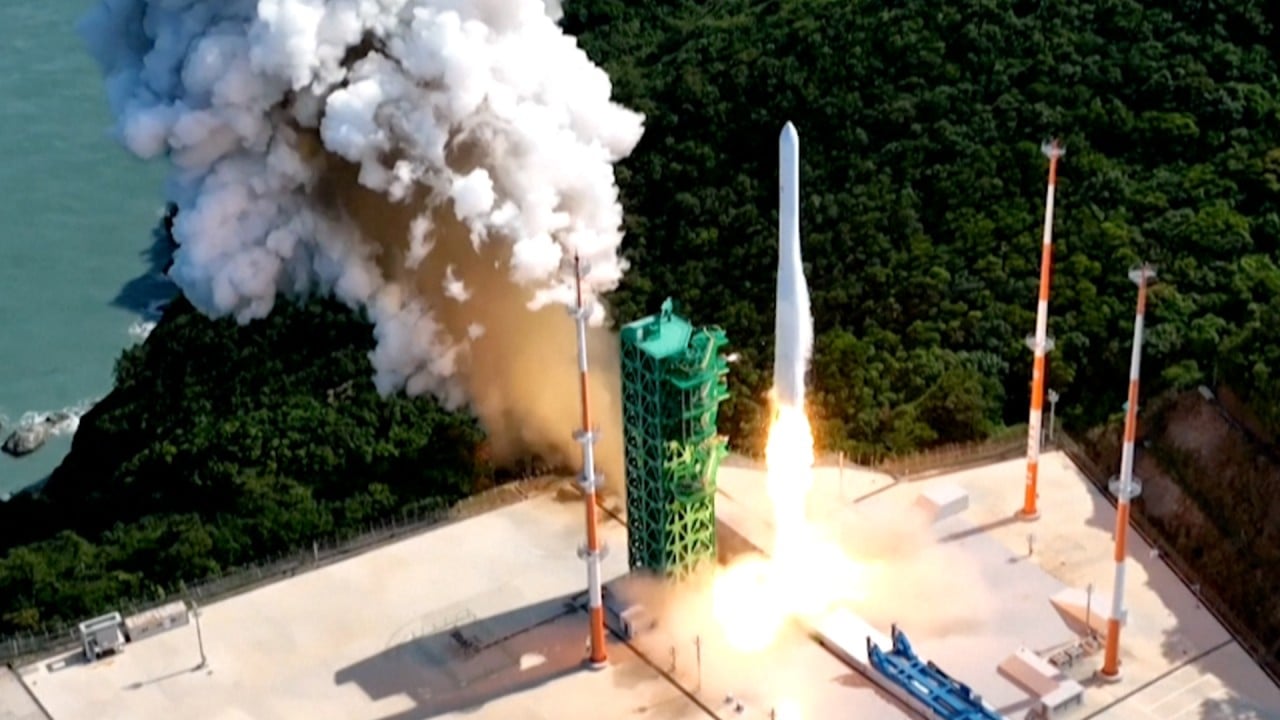
Can South Korea’s star shine on international stage as it seeks to join space race?
- South Korea is set to build an aerospace hub to house some 1,000 firms to tap on the sector’s ‘limitless opportunities and a huge market’
- While Seoul will double its space budget to US$1.12 billion by 2027, some observers question its ability to have the funds, talent and technology enough to be a serious global player
South Korea is reaching for the stars as it banks on aerospace technology to power its future growth, but observers said the government has its work cut out to develop a sector and talent pool that can compete internationally by 2045.
South Korea held a 17.7 per cent share in the global semiconductor market in 2022, the country is hoping to account for 10 per cent share of the international space arena in two decades.
“Gone are the days when space technology was mainly developed for security purposes,” Yoon said at the launch of a planned space cluster in the southeastern city of Sacheon, where up to 1,000 firms will eventually be located.
“We need to push harder towards space, where there are limitless opportunities and a huge market,” he added.

The cluster consists of three hubs: one in Sacheon focusing on satellites, one in the southern town of Goheung to develop launch vehicles, and one in the southern city of Daejeon centred on research.
The government plans to double its annual budget for space development to 1.5 trillion won (US$1.12 billion) by 2027, to go towards infrastructure, rocket launch sites for private companies and space environment testing facilities.
The new budget is expected to lay the groundwork for attracting private investment worth 100 trillion won (US$75.1 billion) by 2045, to create 250,000 high-quality jobs, according to Yoon.
South Korea launches home-grown rocket as rival North prepares spy satellite
Meanwhile, the government will also launch a state space agency, Korea Space Administration (KASA), in a bid to land a domestic spacecraft on the moon in 2032 and reach Mars in 2045.
The KASA, to be built in May in Sacheon, will be tasked with space development plans and industry-wide cooperation domestically and abroad.
It will hire 300 people – 200 researchers and 100 administrative officials – but there are concerns the agency’s remote location, 296km southeast of Seoul, would put off young researchers.
Data from the Korea Association for Space Technology Promotion showed that as of 2022, there were 10,125 space-related personnel in the country, but about three-quarters of them were employed in private firms.
The government has also faced questions whether KASA can match the wages on offer by commercial enterprises, the Korea Times said last month.
Separately from the space cluster project, South Korea is working on a US$1.6-billion project to build its next launch vehicle with enhanced transport capacities to replace its Nuri space rocket.
The new vehicle is expected to make three launches – in 2030, 2031 and 2032 – with the third launch aimed to send a lander to the moon.
The new rocket will be three times stronger than South Korea’s first home-grown Nuri rocket, which showed the country’s ability to place a satellite weighing one metric ton into orbit through its successful launches in 2022 and 2023.
One of the prime challenges for South Korea … is to develop a significant amount of talent pool to accelerate the upstream space market and scale domestic capabilities
Omkar Nikam, a space and defence expert based in France, said South Korea needed a balanced plan to grow both the domestic space market and international collaboration to develop sovereign space capabilities, as outsourcing costs would be high and domestic market capabilities might remain low.
“One of the prime challenges for South Korea … is to develop a significant amount of talent pool to accelerate the upstream space market and scale domestic capabilities,” Nikam told This Week in Asia.
With companies like Hanwha already aiming for the upstream satellite market, South Korea can expect a “gradual growth” in opportunities in both the upstream and downstream space market, he said.
Upstream projects are focused on sending objects into space, while downstream work deals with the applications and services that result from objects being in space.
“While the challenges might be several in such rapid market developments, South Korea needs to tap the demand side in the domestic market and accordingly develop space applications to fulfil those needs,” Nikam said.
This will help the country to master the key space market expertise and then accordingly scale its presence in the international market, he added.
Asia’s space race: Korean rivalry, US alliance take geopolitics into orbit
Lee Il-woo, an analyst at the think tank Korea Defence Network, said South Korea needed to be internationally competitive in the long term to obtain resources such as rare earth and helium 3 gas used for fusion energy from the moon and space.
“The most realistic option for South Korea is to start through participations in international cooperation projects, such as the Nasa-led Artemis Moon exploration programme, and secure its own stakes,” Lee said.
“Therefore, it needs to develop sovereign technology to enhance its influence and presence in such international cooperation projects,” he said.
Global powers have been developing space for security and “political stunts” and aside from the United States, others including Russia, China and European countries face difficulties in making their space industries commercially viable, said Chang Young-keun, a former professor at the Korea Aerospace University.
“Given South Korea’s current space technology level, I’m rather sceptical whether it could make its space industry commercially competitive in a decade or so,” he told This Week in Asia. “Not only money, but technological matters in developing space.”


